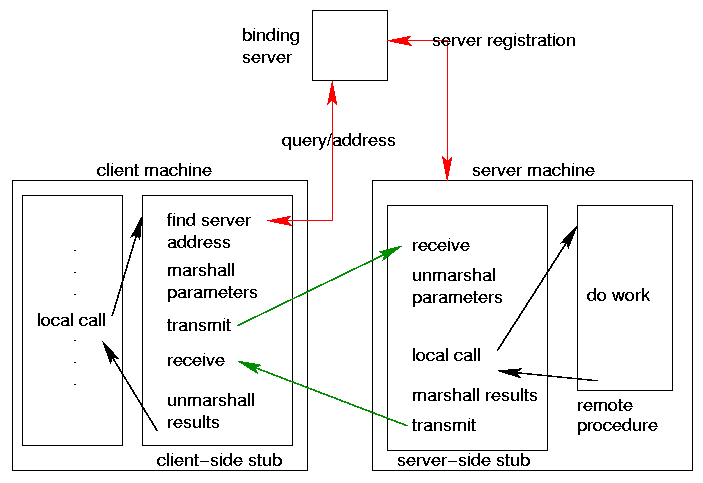Lecture #2: Distributed Operating Systems: an introduction
Topics for today
- Overview of major issues in distributed operating systems
- Terminology
- Communication models
- Remote procedure calls
These topics are from Chapter 4 in the Advanced Concepts in
OS text.
What is a distributed system?
- It consists of multiple computers that do not share a memory.
- Each Computer has its own memory and runs its own operating system.
- The computers can communicate with each other through a communication
network.
- See Figure 4.1 for the architecture of a distributed system.
Why build a distributed system?
- Microprocessors are getting more and more powerful.
- A distributed system combines (and increases) the computing power of
individual computer.
- Some advantages include:
- Resource sharing
(but not as easily as if on the same machine)
- Enhanced performance
(but 2 machines are not as good as a single
machine that is 2 times as fast)
- Improved reliability & availability
(but probability of single failure increases,
as does difficulty of recovery)
- Modular expandability
- Distributed OS's have not been economically successful!!!
System models:
- the minicomputer model (several minicomputers with each computer
supporting multiple users and providing access to remote resources).
- the workstation model (each user has a workstation, the system provides
some common services, such as a distributed file system).
- the processor pool model (the model allocates processor to a user
according to the user's needs).
Where is the knowledge of distributed operating systems
likely to be useful?
- custom OS's for high performance computer systems
- OS subsystems, like NFS, NIS
- distributed ``middleware'' for large computations
- distributed applications
Issues in Distributed Systems
- the lack of global knowledge
- naming
- scalability
- compatibility
- process synchronization (requires global knowledge)
- resource management (requires global knowledge)
- security
- fault tolerance, error recovery
Lack of Global Knowledge
- Communication delays are at the core of the problem
- Information may become false before it can be acted upon
- these create some fundamental problems:
- no global clock -- scheduling based on fifo queue?
- no global state -- what is the state of a task? What is a correct
program?
Naming
- named objects: computers, users, files, printers, services
- namespace must be large
- unique (or at least unambiguous) names are needed
- logical to physical mapping needed
- mapping must be changeable, expandable, reliable, fast
Scalability
- How large is the system designed for?
- How does increasing number of hosts affect overhead?
- broadcasting primitives, directories stored at every computer -- these
design options will not work for large systems.
Compatibility
- Binary level: same architecture (object code)
- Execution level: same source code can be compiled and executed (source code).
- Protocol level: only requires all system components to support a common set
of protocols.
Process synchronization
- test-and-set instruction won't work.
- Need all new synchronization mechanisms for distributed systems.
Distributed Resource Management
- Data migration: data are brought to the location that needs them.
- distributed filesystem (file migration)
- distributed shared memory (page migration)
- Computation migration: the computation migrates to another location.
- remote procedure call: computation is done at the remote machine.
- processes migration: processes are transferred to other processors.
Security
- Authetication: guaranteeing that an entity is what it claims to be.
- Authorization: deciding what privileges an entity has and making only
those privileges available.
Structuring
- the monolithic kernel: one piece
- the collective kernel structure: a collection of processes
- object oriented: the services provided by the OS are implemented as
a set of objects.
- client-server: servers provide the services and clients use the services.
Communication Networks
- WAN and LAN
- traditional operating systems implement the
TCP/IP protocol stack: host to network layer, IP layer, transport layer,
application layer.
- Most distributed operating systems are not concerned with the lower
layer communication primitives.
Communication Models
- message passing
- remote procedure call (RPC)
Message Passing Primitives
- Send (message, destination), Receive (source, buffer)
- buffered vs. unbuffered
- blocking vs. nonblocking
- reliable vs. unreliable
- synchronous vs. asynchronous
Example: Unix socket I/O primitives
#include <sys/socket.h>
ssize_t sendto(int socket, const void *message,
size_t length, int flags,
const struct sockaddr *dest_addr, size_t dest_len);
ssize_t recvfrom(int socket, void *buffer,
size_t length, int flags, struct sockaddr *address,
size_t *address_len);
int poll(struct pollfd fds[], nfds_t nfds,
int timeout);
int select(int nfds, fd_set *readfds, fd_set *writefds,
fd_set *errorfds, struct timeval *timeout);
You can find more information on these and other
socket I/O operations in the Unix man pages.
RPC
With message passing, the application programmer must
worry about many details:
- parsing messages
- pairing responses with request messages
- converting between data representations
- knowing the address of the remote machine/server
- handling communication and system failures
RPC is introduced to help hide and automate these details.
RPC is based on a ``virtual'' procedure call model
- client calls server, specifying operation and arguments
- server executes operation, returning results
RPC Issues
- Stubs (See Unix rpcgen tool, for example.)
- are automatically generated, e.g. by compiler
- do the ``dirty work'' of communication
- Binding method
- server address may be looked up by service-name
- or port number may be looked up
- Parameter and result passing
- Error handling semantics
RPC Diagram

